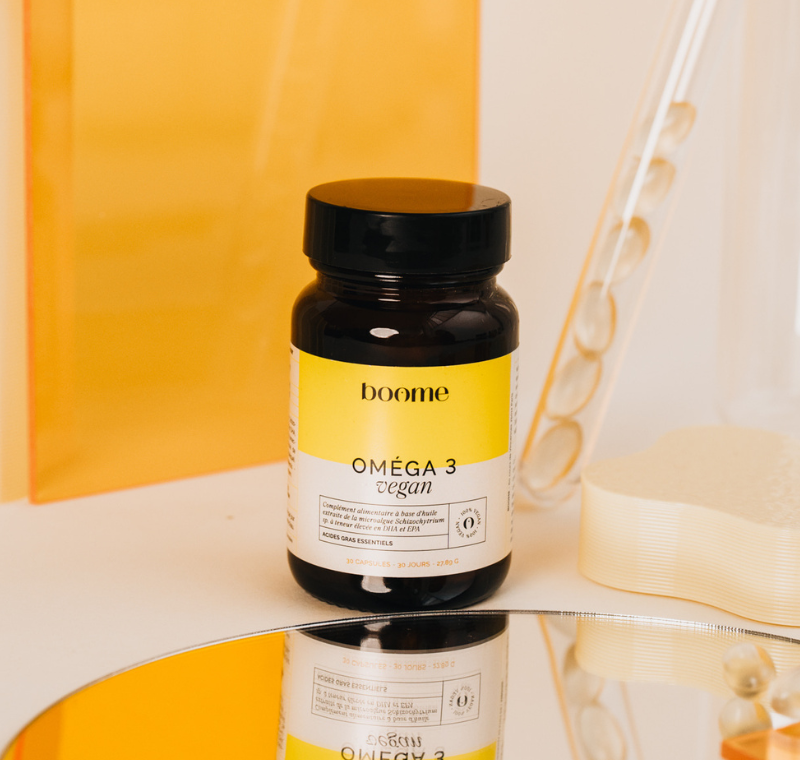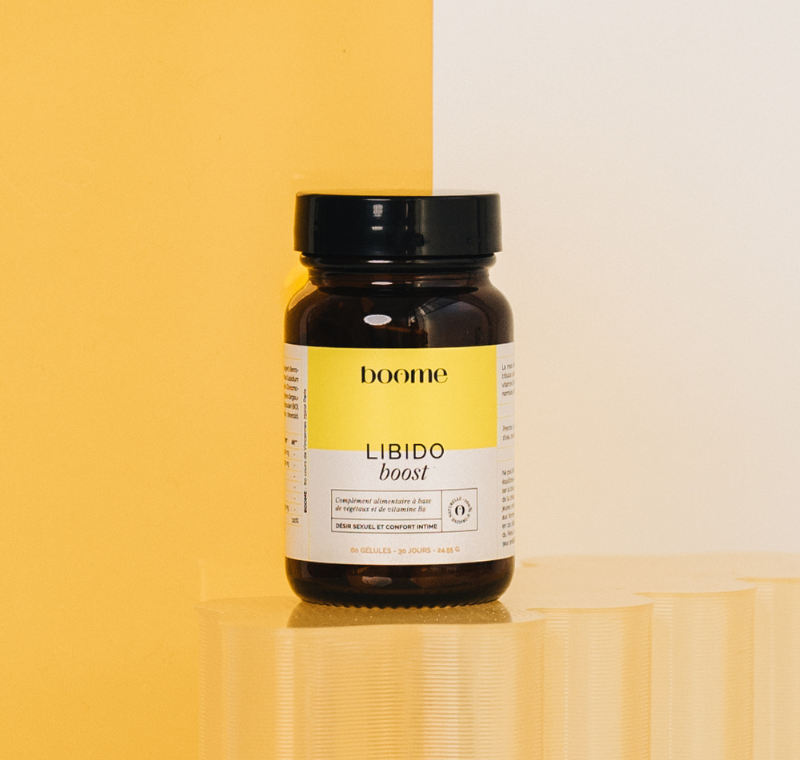
Are you looking for a natural solution to restore radiance to your skin, strength to your hair, and vitality to your joints? Then you should give marine collagen a try. Extracted from wild fish, this little natural treasure is now making its way into many wellness routines. Whether in powder or capsule form, you're hesitant to try it... And we understand! But before you take the plunge, it's essential to understand its true benefits and the best way to use it. In this article, we'll reveal everything you need to know about marine collagen: where it comes from, how it works, and, most importantly, how to effectively integrate it into your daily life. Let's go !
What is marine collagen?
Marine collagen is an essential protein that comes from the scales, skin, and fins of fish. Primarily from wild fish, such as cod, trout, and salmon.
This form of peptide, rich in a high composition of essential amino acids (such as glycine, proline, and hydroxyproline), is very important for our bodies. Indeed, the production of amino acids contributes to the formation of collagen in the human body.
This process, although natural, tends to slow down with age. Thus, as a dietary supplement, in powder or capsule form, marine collagen remains ideal for anyone who wants to prevent the appearance of wrinkles or support their joint comfort.
In other words, marine collagen is known to:
- promote tissue regeneration;
- support skin elasticity.
But how exactly is it harvested? Well, this type of collagen is extracted using a process called enzymatic hydrolysis. The tiny molecules taken from the fish are then broken down into small peptides, making them easier for our bodies to digest via the bloodstream. These same molecules then "graft" directly onto the skin and other tissues. And there you have it, the magic happens!
Thanks to enzymatic hydrolysis, the bioavailability of marine collagen is therefore higher, unlike sources of collagen of animal origin (particularly bovine origin).
What are the different types of collagen?
Collagen comes in several types. And each type plays an important role in the proper functioning of the human body:
- Type I collagen remains the most prevalent in the body, as it makes up the majority of our skin, bone tissue, tendons, and ligaments. It is particularly found in marine collagen… which makes it a great ally for limiting the appearance of wrinkles and fighting joint pain.
- Type II collagen , on the other hand, is mainly found in cartilage. It therefore plays an important role in joint comfort and flexibility. Partially made up of hyaluronic acid, this type of collagen is preferred for relieving joint pain.
- Type III collagen is found primarily in the connective tissues of organs and blood vessels. Its strength is supporting the structure of the skin and the formation of elastic fibers.
What are the benefits and virtues of marine collagen?
1. For the skin
Have you heard of marine collagen's other nickname? It's also called the "anti-aging shield" for the skin. No less! Because its small peptides act directly on the visible signs of skin aging. Yes, with age, our collagen production naturally decreases. And with it, a loss of elasticity and the first wrinkles. Marine collagen thus helps strengthen the skin's structure. And therefore, encourages the reduction of wrinkles.
Important disclaimer: Wrinkles are a natural process, and you'll have to deal with them no matter what. Consuming collagen won't miraculously rejuvenate you. Nor will it reverse the aging process. Even if some advertisements make you believe otherwise. Beware of dubious marketing.
Also note that this type of collagen promotes better skin hydration. The amino acid production found in collagen helps retain water in the skin's layers. This makes the skin softer, smoother, and contributes to that visible "plumping" effect we love. You can also combine it with hyaluronic acid for a double kiss-cool effect.
Finally, marine-derived collagen helps improve skin suppleness. Because it stimulates natural collagen production, it helps keep skin elastic and resilient against external aggressors, such as harmful UV rays and pollution.
2. For hair
Marine collagen is also your hair's best friend! Because it gives it strength, shine, and volume. Nothing less. Why? Because it's made up largely of keratin. The production of which is linked to the amino acids found in collagen. Yes... Everything is connected! By incorporating marine collagen into your routine, you're helping your body provide your hair with the nutrients it needs to stay in top shape.
Marine collagen also promotes hair (re)growth. It also helps reduce breakage and split ends. Thanks to its antioxidant action, it stimulates hair growth by providing hair follicles with the nutrients they need to grow.
Therefore, we highly recommend this food supplement if you have:
- fragile hair;
- who experience periods of decline…
- ...because of a stressful lifestyle;
- or hormonal imbalances.
A regular treatment can revitalize your hair and enhance its natural shine. Not bad, right?

Achat express
3. For the bones
The benefits of marine collagen aren't limited to skin and hair! They also play a major role in maintaining normal bones. Rich in type I collagen, it helps strengthen bone tissue. How? By providing bones with the amino acids needed to regenerate their structure. With age, bones gradually lose collagen. The result: bone fragility, joint pain, and a risk of osteoporosis.
So, how does marine collagen help us maintain normal bone structure? Its secret lies in its ability to stimulate the production of new bone tissue. This is why regular marine collagen supplementation can generate a protective effect.
By integrating it into your lifestyle, you take care of your bones by:
- limiting joint pain;
- pampering your bone tissue;
- preventing possible age-related bone pathologies.
In short, it’s all good for joint health!
4. For connective tissues
One last significant benefit: marine collagen also offers numerous benefits to connective tissues. That is, everything related to:
- the ligaments;
- the tendons;
- the wall of blood vessels;
- and cartilages.
These tissues ensure the cohesion and flexibility of your joints. Thanks to them, you're mobile every day. Pretty practical, we grant you!
So, where does marine collagen fit into all this? Well, it supports the integrity and flexibility of these tissues. While reducing joint inflammation (and therefore, joint pain).
It also prevents the risk of injury – particularly beneficial for those who exercise regularly. Marine collagen also contributes to the recovery and protection of joint cartilage.
To benefit from the benefits of marine collagen, what dosage and follow-up instructions should be followed?
As you can see, marine collagen is excellent for your health! Provided, of course, that you consume it under the best possible conditions... We'll explain everything.
How long does a collagen treatment last?
Whether in powder or capsule form, we recommend scheduling a three-month course of treatment to see visible results. Why? Because this is the minimum time required for your body to gradually absorb the benefits of collagen. This is also the time it takes for cells to regenerate. This includes:
- of the skin
- bone tissue
- hair
- articular cartilage.
Why not try a seasonal treatment, for example? Starting it in spring will give a boost to skin that's been lacking sun.
Or, by combining it with hyaluronic acid or vitamin C, to increase its effects tenfold.
Finally, the mechanism of action of collagen will also prove fantastic for limiting postpartum hair loss .
In short, it's up to you to choose your preferred time! However, keep in mind that marine collagen should also be part of a healthy lifestyle and a nutrient-rich diet. Otherwise, you risk not experiencing all of its benefits.
Is it good to take collagen every day?
Want to take collagen every day? Apparently , no problem. Taking a collagen supplement daily is even recommended to boost its effects. By maintaining consistent levels, you'll stimulate constant cell regeneration! Collagen is a protein the body knows well, as it's naturally made up of it. It therefore tolerates it without any problem—especially marine collagen, because its structure remains very similar to human collagen.
However, be careful not to exceed the recommended dosages, to avoid any risk of overload or adverse effects. Regularity + moderation = a winning combination!
What are the contraindications and potential side effects of collagen?
Even if collagen remains well accepted by the body, you should still take certain precautions.
For example, if you're allergic to seafood... This dietary supplement, extracted from wild fish, won't do you any good! You may therefore have a bad reaction to it.
Some people with sensitive stomachs have also reported mild digestive upsets, such as bloating and nausea.
Finally, pregnant or breastfeeding women should seek the advice of a healthcare professional before embarking on a course of marine collagen powder or capsules. If you are expecting a child, focus instead on the benefits of omega 3 , which will work miracles for you and your baby!
In short, marine collagen is proving to be a valuable ally for those seeking to maintain the health of their skin, bone tissue, and joint cartilage. Follow the recommended daily dose, take regular courses of treatment, and incorporate it into a varied diet... and you'll be able to enjoy its natural benefits—which, as you've probably guessed, are endless!










